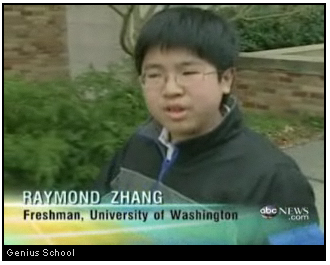 Recently John posted about Raymond Zheng, a precocious 14 year old college freshman. Although I know nothing about Raymond beyond the video that John sent out, I’d like to use him as a starting point to explore a topic that I find fascinating: education philosophy, or in plainer terms, how to raise your kid.
Recently John posted about Raymond Zheng, a precocious 14 year old college freshman. Although I know nothing about Raymond beyond the video that John sent out, I’d like to use him as a starting point to explore a topic that I find fascinating: education philosophy, or in plainer terms, how to raise your kid.
Now, I should start by disclosing that I do not have any children of my own, as I’m 24 and spend my weekends drinking aggressively with my friends. That said, I feel that I’ve experienced enough of life to have a rough idea of what skills and values lead to success, which means that I have an opinion on how to educate a child to instill those things.
I disagree with what I will term as the ‘Raymond Zheng’ approach to education for two reasons: first, it seems to poorly provide for the types of interpersonal skills that are critical for success. Schools are about more than transferring academic knowledge; they are communities where people bond, form relationships, and go through the process of maturing into adulthood together. This program misses that by thrusting these kids into impersonal lecture halls with students who they can’t possibly relate to in any meaningful way. It’s telling that when the reporter asked Raymond to explain his computer program, Raymond gave the wrong answer. Not wrong in a technical sense, but wrong in that it failed to take into account the reporter’s level of understanding of the subject and was thus useless. It lacked a level of human understanding that you can’t learn by taking more advanced classes but which comes naturally to anyone who has spent time meeting people and making friends.
Similarly, the girl who dismissed going to prom completely missed the point; yes, she can still go with her friends (although I question how close she can remain with her friends given that she won’t see them in school anymore and is going through a completely different set of experiences as they are). But prom is a communal ritual, and she is no longer part of that community. It is a step towards adulthood — it’s no accident that so many high schoolers choose to lose their virginity at prom — that has a certain collective emotional resonance that she will likely miss out on.
Kids who grow up going through the normal education system are getting a lot more out of it than just an academic education. By being constantly surrounded with other people who are their same age and going through the same maturation process as them, and going through communal school events like prom, they are developing the ability to interact with other human beings. This is critical to success, not only because most careers involve a high amount of collaborative work, but more importantly because being a content, well adjust human being requires forming good relationships with other people. When I said earlier that I have a rough idea of what skills lead to life success, one of the things I meant is that I have never met a single person who is happy but does not have a lot of friends.
The Raymond Zheng approach also emphasizes the knowledge acquisition over creativity, when in most real life settings (at least the settings a high powered achiever like Ray is likely to get involved in) the latter is far more important. Creativity is a nebulous subject, but everything I’ve witnessed, read about, or experienced first hand suggests that it starts with play (there is an excellent book on improvisational acting called Impro that goes into this subject in more depth.) Watching Raymond, you don’t get the sense that he plays very much, which makes me wonder how he’ll do once he’s gotten through all the academic knowledge that he’s learning and moves on to the real goal of adding to knowledge and creating something new.
Raymond seems like a nice kid, and for all I know I might have the specifics of his story wrong. But I do want to call attention to and indict a way of thinking that is prevalent within Asian and Asian American communities — the exclusive emphasis on academic performance creates real problems and prevents children from growing up into successful, well adjusted human beings.








